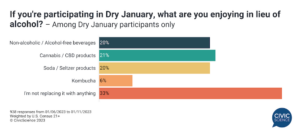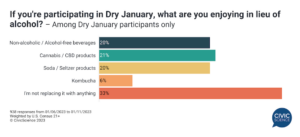One in five people taking part in Dry January are substituting alcohol for cannabis, a new survey from the US shows.
Dry January has become increasingly popular in recent years, as consumers attempt to ditch the drink throughout the first month of the year, following the boozy festive period.
According to the charity, Alcohol Change UK, the official Dry January programme is the result of one woman deciding to quit drinking to prepare for a half-marathon and experiencing almost immediate health benefits including increased energy, better sleep and weight loss.
The campaign began with 4,000 participants in 2013, growing to an estimated 130,000 people in 2022.
The challenge has also spread overseas, with a recent survey showing that almost half (41%) of US alcohol drinkers polled were considering quitting alcohol during January 2023, with those aged 21-34 most likely to do so.
The latest data, from US polling platform Civic Science, shows that among those who have taken on the challenge, a considerable number are turning to alternatives – including cannabis – to fill the gap.
Roughly 60% of those partaking in Dry January are turning to substitutes including non-alcoholic beverages, cannabis/CBD products and soda/seltzer products.
Cannabis was the most popular alternative, with 21% saying they were consuming to cannabis-based products this month, followed by non-alcoholic beverages (20%), soda and seltzer (20%) and kombucha (6%).

Those in the younger age group (21-24 years) were most likely to consume cannabis, with 34% saying this was their preferred alternative, compared to 24% of those aged 25-34, 22% of 35-54-year-olds and just 9% of those aged 55 and older.

Changing attitudes towards alcohol and cannabis
The findings won’t come as much of a surprise to many, with cannabis increasingly becoming a preferred method for switching off at the end of the week, especially among younger generations.
A 2022 survey carried out by New Frontier suggests that two-thirds of US-based consumers aged between 18 and 44 (Gen-Z and millennials) prefer cannabis to alcohol, and more than half of the same age group are replacing (at least some of) their alcohol use with cannabis.
Research also shows that when medical cannabis became legal in Canada, alcohol sales decreased, indicating that people were substituting cannabis for alcohol. Elsewhere US states which have legalised cannabis were found to have lower rates of alcohol use disorder.
While there are always risks when it comes to consuming any substance, cannabis is increasingly becoming thought of as a safer – and potentially healthier – alternative to alcohol.